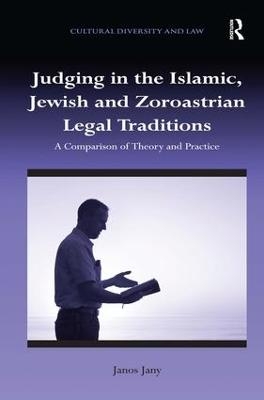
Judging in the Islamic, Jewish and Zoroastrian Legal Traditions
A Comparison of Theory and Practice
Seiten
2012
Routledge (Verlag)
978-1-4094-3716-1 (ISBN)
Routledge (Verlag)
978-1-4094-3716-1 (ISBN)
Presents a comparative analysis of the judiciary in the Islamic, Jewish and Zoroastrian legal systems. This book compares postulations of legal theory to legal practice in order to show that social practice can diverge significantly from religious and legal principles.
This book presents a comparative analysis of the judiciary in the Islamic, Jewish and Zoroastrian legal systems. It compares postulations of legal theory to legal practice in order to show that social practice can diverge significantly from religious and legal principles. It thus provides a greater understanding of the real functions of religion in these legal systems, regardless of the dogmatic positions of the religions themselves. The judiciary is the focus of the study as it is the judge who is obliged to administer to legal texts while having to consider social realities being sometimes at variance with religious ethics and legal rules deriving from them. This book fills a gap in the literature examining Islamic, Jewish and Zoroastrian law and as such will open new possibilities for further studies in the field of comparative law. It will be a valuable resource for those working in the areas of comparative law, law and religion, law and society, and legal anthropology.
This book presents a comparative analysis of the judiciary in the Islamic, Jewish and Zoroastrian legal systems. It compares postulations of legal theory to legal practice in order to show that social practice can diverge significantly from religious and legal principles. It thus provides a greater understanding of the real functions of religion in these legal systems, regardless of the dogmatic positions of the religions themselves. The judiciary is the focus of the study as it is the judge who is obliged to administer to legal texts while having to consider social realities being sometimes at variance with religious ethics and legal rules deriving from them. This book fills a gap in the literature examining Islamic, Jewish and Zoroastrian law and as such will open new possibilities for further studies in the field of comparative law. It will be a valuable resource for those working in the areas of comparative law, law and religion, law and society, and legal anthropology.
Janos Jany is founder and current Head of the Dept. of International Studies Pázmány Péter Catholic University, Budapest, Hungary. He is the author of several books on Islamic and Persian law and has published in both Hungarian and English language journals.
Introduction; Part 1 Theory; Chapter 1 Historical Overview; Chapter 2 Legal Theory; Part 2 Practice; Chapter 3 Institutions; Chapter 4 The Judge and the Litigants; Chapter 5 The Judge and Jurisprudence; Chapter 6 The Judge and Society; Chapter 7 Conclusions: Lessons in Legal Sociology;
| Reihe/Serie | Cultural Diversity and Law |
|---|---|
| Verlagsort | London |
| Sprache | englisch |
| Maße | 156 x 234 mm |
| Gewicht | 620 g |
| Themenwelt | Geisteswissenschaften ► Religion / Theologie |
| Recht / Steuern ► Arbeits- / Sozialrecht ► Sozialrecht | |
| Recht / Steuern ► EU / Internationales Recht | |
| Sozialwissenschaften ► Soziologie ► Spezielle Soziologien | |
| ISBN-10 | 1-4094-3716-7 / 1409437167 |
| ISBN-13 | 978-1-4094-3716-1 / 9781409437161 |
| Zustand | Neuware |
| Haben Sie eine Frage zum Produkt? |
Mehr entdecken
aus dem Bereich
aus dem Bereich
meine Rechte: Wohnen, Arbeiten, Steuern, Mobilität
Buch | Softcover (2024)
C.H.Beck (Verlag)
CHF 16,65
Textausgabe mit ausführlichem Sachverzeichnis
Buch | Softcover (2024)
dtv Verlagsgesellschaft
CHF 29,25
Buch | Softcover (2024)
dtv Verlagsgesellschaft
CHF 27,85


